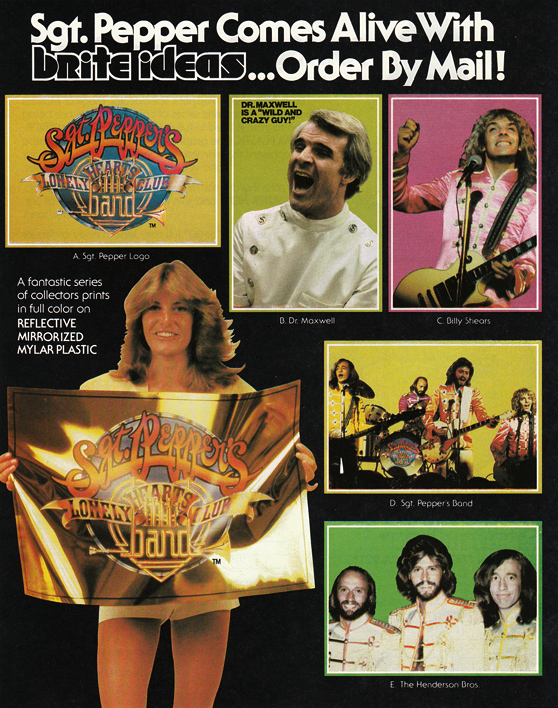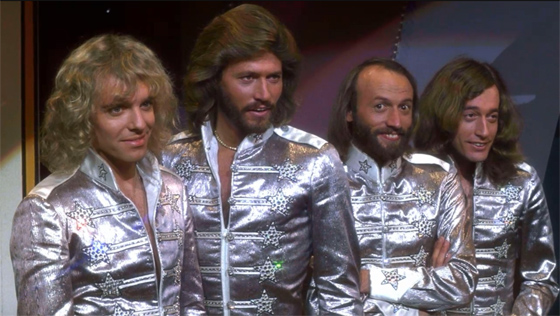
I understand that sometimes it’s just too difficult to leave something alone. You love it too much, and you have to express it, even if it might embarrass the one you love, and even if you might look like an ass. Such is the case with Sgt. Pepper’s Lonely Hearts Club Band (1978). I’m sure that everyone involved in this film loved Sgt. Pepper (well, except perhaps George Burns…he looks a little bemused by the whole thing). In a way, that’s endearing, and I can’t hate this film. Every single moment declares “We love the Beatles!” – just as it declares even more loudly, “It is the 70’s!” The original album remains unscathed, and the movie became an instant time capsule, a head-scratcher to be wondered at for generations of Beatles fans to come. It was not the first (there was also 1976’s All This and World War II, a stock footage compilation set to Beatles covers), and its existence hasn’t prevented further indulgent tributes, from Cirque du Soleil’s Las Vegas act Love to Julie Taymor’s Across the Universe (2007), which has Eddie Izzard in the Mr. Kite role instead of Burns. Look, I like Across the Universe just fine (despite a story that’s no less clichéd), and I’m surprised to discover, after years of deliberately avoiding the thing, that I don’t mind the Sgt. Pepper film all that much. The reason is the Beatles. It’s hard to mess up these songs, although damn if director Michael Schultz (Car Wash) doesn’t try.
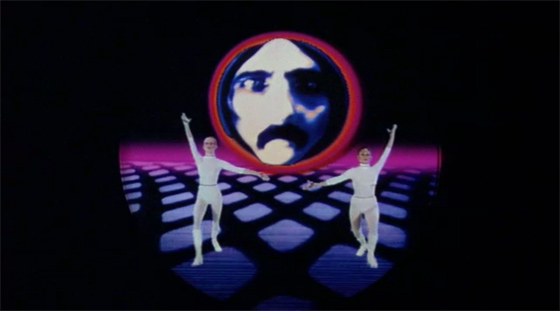
Alice Cooper, as Marvin Sunk the Sun King, sings "Because."
Even Schultz is not entirely to be blamed. The project began first as an off-Broadway musical in 1974 directed by Hair‘s Tom O’Horgan, and since that iteration is no longer with us, it’s worth excerpting the opening of TIME Magazine’s review, before the “To read the entire article, you must be a TIME Magazine subscriber” message cuts us off. Really, this is all of the review you need: “If a medical dictionary of the theater should ever appear, one entry would be a grotesque disease known as O’Horganitis. Its chief aspect is the metastasis of spectacle over substance. Its subsymptoms are bloat, inanity, hallucination, sexual kinkiness and contagious vulgarity. The disease reached plague proportions in the late ’60s, but sporadic outbreaks still occur; and if one wishes to be mortally infected, the place to go is Manhattan’s Beacon Theater where Sgt. Pepper’s Lonely Hearts Club Band…” Anyway, critical loathing be damned, the title of the property presented such mass commercial appeal that a film adaptation came into being four years later. “Fifth Beatle” George Martin, who had produced all of the Beatles albums but one, was hired as musical director of the film, and Geoff Emerick, the band’s innovative sound engineer, came along to serve a similar function. For the starring roles, the producers turned to the biggest musical acts of the day: the Bee Gees – who had been around for over a decade, but had only recently become superstars with their soundtrack to Saturday Night Fever (1977) – and Peter Frampton, whose Frampton Comes Alive of a few years earlier was the biggest-selling live album of all time. Expectations were sky-high. I recently came across a novelization of Sgt. Pepper’s Lonely Hearts Club Band in a used book store. If you think you can sell a novelization of an almost dialogue-free musical based on a 60’s concept album, that’s confidence.
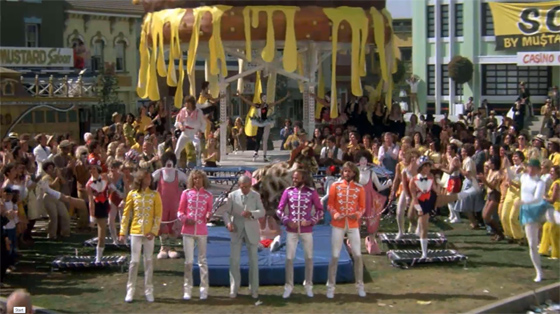
Peter Frampton, the Bee Gees, and George Burns sing "Being For the Benefit of Mr. Kite!" in the fictional town of Heartland.
There may not be much dialogue, but there’s a narrator – Burns/Mr. Kite – who rasps a quick history of the Sgt. Pepper legend, as reinvented here: a WWI hero/bandleader awarded a medal for “music above and beyond the call of duty,” and who continued to inspire his hometown of Heartland for half a century. After his death, he left his medal to his grandson Billy Shears (Frampton), who would continue his legacy and recreate the Lonely Hearts Club Band with the brothers Henderson (played by Barry, Robin, and Maurice Gibb, aka the Bee Gees). Their music becomes popular enough to attract the attention of the music industry, personified by the corrupt B.D. (Donald Pleasence, with hair) and seductive rock star Lucy (Dianne Steinberg). Meanwhile, Mean Mr. Mustard (British comic actor Frankie Howerd), “a demented ex-real estate agent,” plots to take over Heartland by destroying the band with the help of his two wig-wearing robot assistants. This plot involves abducting Billy’s girlfriend Strawberry Fields (Sandy Farina) and selling the band’s prized instruments to the crazed surgeon Maxwell Edison (Steve Martin) and Marvin Sunk the Sun King (Alice Cooper). As I mentioned, there’s little dialogue, just a narrative propelled by Burns’ exposition, Mr. Mustard’s computer spouting directives, and songs, songs, songs. Our heroes don’t so much act as mug in the camera’s direction. When Strawberry Fields is killed during an Aerosmith cover of “Come Together,” Frampton seems helpless to create an expression of grief upon his face, staring at her dead body with apparent indifference. He’s rescued in the next scene, in which he sings “Golden Slumbers/Carry That Weight” with a face so dampened by tears that it looks like he was just trying to fix a hole where the rain gets in.
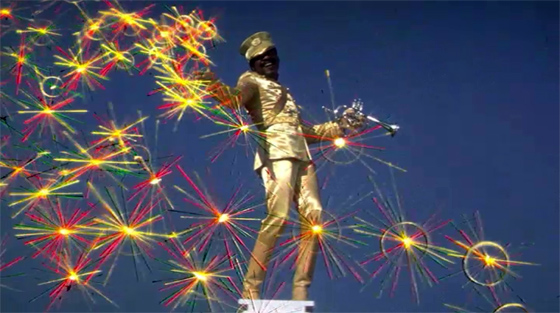
Billy Preston, singing "Get Back," saves the day with fingers that shoot sparkling special effects.
So much to see here. Steve Martin, in “King Tut” mode, singing (badly) “Maxwell’s Silver Hammer” while grabbing cash from a group of elderly patients on a conveyer belt, then smacking them on the head with a hammer and a flash of sparkly light to turn them all into boy scouts. He uses the hammer to battle Frampton in one of the strangest Star Wars homages you will ever see. Alice Cooper is a Reverend Sun Myung Moon type…I guess…who is first presented as a giant levitating head singing “Because,” which is not necessarily the first Beatles song you would think to have him cover. Most of the songs come from Sgt. Pepper and Abbey Road, George Martin’s two favorite Beatles albums, so you’re a bit at the mercy of his opinion. Burns creaks his way through “Fixing a Hole” (thankfully, he doesn’t get very far); Pleasence sings (or speaks) “I Want You (She’s So Heavy)”; Howerd does “Mean Mr. Mustard,” of course, but to the atrocious accompaniment of his robot companions. There are some good renditions, too, particularly those sung by Farina, including “Here Comes the Sun.” The Aerosmith performance is solid, as is a late, if mind-blowingly strange, cameo by Billy Preston (“Get Back,” a Beatles song to which he originally contributed back in ’69). As for Frampton and the Bee Gees, their covers are respectable and occasionally quite good – which proves that if you can just hand great songs to talented singers, you’re in safe territory: witness Barry Gibb tackling “A Day in the Life” with minimal cinematic silliness around him, and emerging with a decent little music video. Robin Gibb, who died this past Sunday (leaving Barry the sole surviving Bee Gee), has a fine moment with “Oh! Darling,” as well. Ultimately, of course, the film can’t move beyond pure kitsch. The finale has a slew of 70’s celebrities posed in imitation of the Sgt. Pepper cover, singing the reprise version of the title song, and – look, there’s Carol Channing. Look, there’s Dame Edna. Look, there’s Dr. John and Sha Na Na. You’ll have to read the ending credits to figure out the entire “We Are the World”-style celebrity roundup. It’s a pointless spectacle, really – just a bunch of famous people gathering together to say they love the Beatles. Maybe there’s nothing wrong with that; I’m okay with it. But it will happen again, I promise you.
